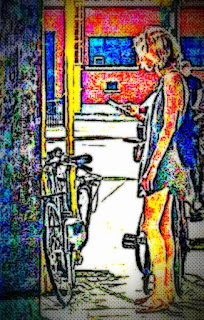There was this older, thin, slightly stooped guy that I saw in neighborhood grocery stores. We always nodded "How you doin?" one day we went for coffee. His name is Mel, he lives alone, a retired book keeper who said he was a very boring person with a very boring life but has talents, one: excellent shoplifter, two: very clever with witty, come-back lines.
About "people I met" of which all, most, some, a few or none may or may not know that other people I met may or may not read about their stories.
Monday 4 October 2021
Mel and his Many Talents
Friday 24 September 2021
Jancsi and the Legend of the Air Beast
I meet Jancsi every Thursdays at ten in the admin office on the ground floor to borrow the cart to deliver food to Parkdale Foodbank clients in the building. He is a big guy (at least 300 lbs.) of an age difficult to guess (I'd say thirty something to fifty something) with masses of dark hair covering his face and head. He also has remarkably small feet. His English is grammatically excellent and he has a perplexingly rich vocabulary all spoiled by his atrocious Hungarian accent. We say ”Hi!” and load the boxes from the trunk of my car onto the cart and go to the elevator. I used to start at the top floor working my way down but when I was paired with Jancsi he insisted we deliver in ascending order, I am easy, so this is how we do it: unit 103 first and 909, on the ninth floor, last. Then we take the empty cart to the elevator, punch the down button and wait. Inevitably we end up looking at the dirty sign: ”EXIT AIR BEAST”. Jancsi jokes (I cannot tell if is German, Hungarian, English or his combination of the three) so I nod and smile to get the few seconds I need to untangle the words from his messy pronunciation. He usually quotes Schiller's Fiesco's Conspiracy at Genoa: ”The Moor has done his work—the Moor may go" He says: disappear, exit like us, the Air Beasts. We take the cart back to the office and say ”So long, until next week, yeah?”. Yesterday Jancsi stared at the so familiar sign for a long time and then started scratching the lower left-hand corner of the cardboard with his fingernail. In time, the grimy paper peeled off to reveal the surprising full original text: ”EXIT STAIR B EAST --->” Janci grabbed his heart and cried out: ”Jaj, Istenem!” and we laughed all the way to the office
Monday 20 September 2021
Murad et Grand-père
Monday 23 August 2021
Charlie Melfort
This is Klaus-Heinz Frischzeit (*2 April 1922, Trier, Rhineland-Palatinate, Germany – †1 July 2010, Melfort, Saskatchewan, Canada), I never met him, but I know his story from Burt Melfort, who also supplied the picture, but let me start at the beginning:
Saturday 21 August 2021
Edward Thomas
Thursday 19 August 2021
Leonora Fitzroy
This is Leonora Fitzroy as I met her the other day at Pape and Harcourt. When she said her last name, I remarked that it was famously used by illegitimate children of the British royalty and Leonora said she knew, as she has an MA in History with a minor in Philosophy. She said people call her Leo as she is born in August and went on to say that, unfortunately, she didn't find a job in her chosen field and is currently a part-time lingerie model and volunteer for the Community Share Food Bank at The Church of the Ascension. We had that in common, I said (not de modelling, the volunteering). I asked if she'd like to have coffee and tell me her story and she said "Thank you, but that's my bus coming up". I wished her good luck with all that stuff, said bye and walked South. When I turned around I saw her unlock her bike, put on her helmet and pedal away ... now I'm not even sure if her name is really Leo.






